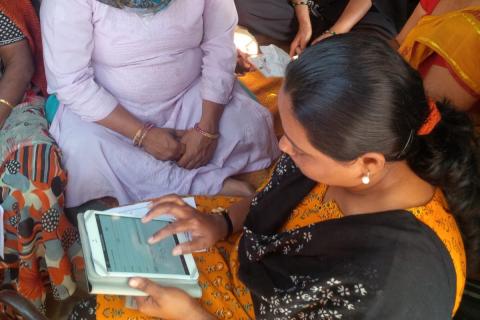
By Dr. Rajiv J. Shah, President, The Rockefeller Foundation
While private-sector businesses have been building and deploying data science capabilities for many years in the tech age, most organizations in the non-profit, civic, and public sectors are far behind. They have a strong appetite to use applied data to make their work go farther, faster, and ultimately help more people – but they lack the resources to do so.
In other words: everyone produces data, but not everyone benefits from it.
We know the power data science can have for social good because we’ve seen it in action. When mission-driven organizations have the right talent, tools, and knowledge, data science can generate real human impact: helping vulnerable families access public benefits; saving water and money during droughts; and saving time in resettling refugees – so they can find homes and jobs faster.
That’s why today The Rockefeller Foundation and the Mastercard Center for Inclusive Growth announced a joint, $50-million investment over five years to build the field of data science for social impact through a transformational model for collaborative philanthropy. More than dollars, we are announcing a commitment to mobilize additional partners, resources, and networks to accelerate the use of data science by empowering non-profit, civic, and government organizations with the tools, expertise, and knowledge they need to help solve the world’s most pressing challenges.
Building on The Rockefeller Foundation’s leadership in social impact and the Mastercard Center for Inclusive Growth’s innovative approaches to data philanthropy, the collaborative will identify key priorities and investment opportunities to accelerate data for good, whether that be research, skills or new technology platforms.
By growing the data science capabilities of social and civic organizations, Data Science for Social Impact can help local leaders uncover new insights and trends from their data and build more impactful programs for the communities they serve.
The first investment will be $20-million in funding to DataKind, a global non-profit that connects data science talent with social organizations – harnessing the power of data science and AI in the service of humanity. With chapters in New York, Singapore, Bangalore, London, San Francisco, and Washington, D.C., DataKind has deployed expert volunteer data scientists and engineers from their network of over 30,000 to work on more than 250 projects around the world since it was founded in 2011. Our investment will enable DataKind to move from a project- to a platform-based model, in which it will support more organizations on a set of common issues, including community health and inclusive growth.
Here are three inspiring examples of how data science can, and has, led to positive social change:
- Better Refugee Placement in Switzerland: Data scientists from the Immigration Policy Lab at Stanford University and ETH Zurich used historical data on where refugees found jobs to build an algorithm that optimizes placement of incoming refugees. The teams are piloting the algorithm in Switzerland, guiding Swiss immigration officials to make more efficient placements. This is a key example of quickly turning high-quality machine learning science into a useful product that improves decision-making and ultimately benefits people’s lives.
Saving Money and Water in Drought-Stricken California:Amid record droughts and ravaging wildfires, DataKind worked with Moulton Niguel Water District in southern California, where they brought together a team of data scientists – led by a senior engineer at Netflix and researchers from UCLA – to build an algorithm that can accurately predict water demand down to the city block. They used to ship in water tankers at massive cost to meet demand; so far this algorithm has saved the district over $25 million. It also helped make Moulton Niguel one of the only water agencies that actually thrived during California’s recent droughts.
- Making Essential Benefits More Accessible: Millions of people need food, healthcare, and housing but are not enrolled in programs that could help meet these needs. Each year, Benefits Data Trust – a grantee of The Rockefeller Foundation through our Communities Thrive Challenge – helps tens of thousands of people receive critical support using data, targeted outreach, policy change, and new technologies. Since its inception, BDT has submitted over 800,000 applications and secured over $7 billion in benefits and services that help individuals and families reach financial stability. The same tools that are under scrutiny for threatening privacy or spreading disinformation can also be used to pave a better path.
We live in a pivotal moment when rapid advancements in science and technology offer millions of people the means to rise out of poverty. While that progress has benefitted so many, there are still too many who lack access to opportunity. Only by working together – standing on each other’s shoulders to scale the highest, hardest walls in global development – will we solve the world’s toughest challenges.
Today at the World Economic Forum’s Annual Meeting in Davos, Switzerland, we took a major step forward in solving that challenge when we invited data scientists, corporate and social sector leaders, and government officials to join this new movement. We’re confident Data Science for Social Impact will help to ensure data science generates not just wealth for a few, but well-being for all.
To learn more, visit www.rockefellerfoundation.org/dssi.